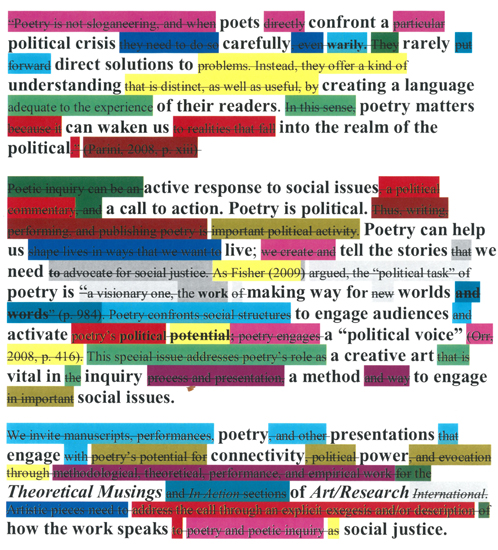Christ Would Break Your Tongue
DOI:
https://doi.org/10.18432/ari29336Keywords:
poetic inquiry, authority, gender, colonialism, residential schools, voice, churchAbstract
“Christ Would Break Your Tongue” is part of my on-going exploration of growing up as a United Church minister’s daughter in small-town Ontario. In the title poem, I inquire into the interstices of gender, voice, and authority. In “Dominion” I grapple with how the Christian underpinnings of Western culture place humans above other creatures and lifeforms to the detriment of all living beings. In “Billy Stewart’s Geography” I begin to explore the church’s role in political oppression, colonialism, and residential schools, building on my poetic interests in family dynamics and place (Stewart, 2003; 2012). I use poetic inquiry (Butler-Kisber, Guiney Yallop, Stewart, & Wiebe, 2017; Faulkner, 2009; Galvin & Prendergast, 2016; Prendergast, Leggo, & Sameshima, 2009; Thomas, Cole, & Stewart, 2012) as a research method to reflect on and through language, letting the poems be the plumb-line of the research process. Poetry’s use of the associative, the particular, and the unconscious allow me to explore terrain which may have been previously un-worded. This is needed to write through shame and grief. I believe with Orr (2002) that “the more of our own stories that we can tell, the richer and more complex our selves become. The richer a use we make of our past experience, the more open we are to present experience” (p. 102). This openness is crucial in the search for word and action. Educator Maxine Greene (1977) calls us to be open or “awake.” How can poets be awake to this complex social/political moment and use their craft to speak? Poetry works with stories and lyric which are once personal, ideological and often shaped by religion. As a white settler Canadian, I strive to uncover the complicity of my religious and Northern Irish background in hierarchical and oppressive relations. My hope is to provoke.
References
Butler-Kisber, L., Guiney Yallop, J. J., Stewart, M., & Wiebe, S. (Eds.) (2017). Poetic Inquiries of Reflection and Renewal. Halifax, NS: Nimbus.
Faulkner, S. L. (2009). Poetry as method: Reporting research through verse. New York, NY: Routledge.
Galvin, K., & Prendergast, M. (2016). Poetic Inquiry II – Seeing, caring, understanding: Using poetry as and for inquiry. Rotterdam, NL: Sense Publishers.
Greene, M. (1977). Toward Wide-Awakeness: An Argument for the Arts and Humanities in Education, Teachers College Record 79(1), 119-125.
Orr, G. (2002). Poetry as survival. Athens, GA: University of Georgia Press.
Prendergast, M., Leggo, C., & Sameshima, P. (Eds.). (2009). Poetic inquiry: Vibrant voices in the social sciences. Rotterdam, NL: Sense Publishers
Stewart, S. (2003). A hat to stop a train. Toronto, ON: Wolsak and Wynn.
Stewart, S. (2012). The shape of a throat. Winnipeg, MN: Signature Editions.
Thomas, S., Cole, A. L., & Stewart, S. (Eds.). (2012). The art of poetic inquiry. (Volume 5, Arts-informed Inquiry Series). Big Tancock Island, NS: Backalong Books.
Published
How to Cite
Issue
Section
License
Copyright (c) 2018 Art/Research International: A Transdisciplinary Journal

This work is licensed under a Creative Commons Attribution-NonCommercial-NoDerivatives 4.0 International License.
Authors who publish with Art/Research International agree to the following terms:
a. Authors retain copyright and grant the journal right of first publication and the right to sublicense the Contribution, in the form in which it is published by the journal, to others under the terms and conditions of the of the Creative Commons Attribution-NonCommercial-NoDerivs (CC BY-NC-ND) that allows others to download the work and share the work with others with an acknowledgement of the work's authorship and initial publication in this journal, but they cannot change the work in any way or use any part of the work commercially.
b. Authors are able to enter into separate, additional contractual arrangements for the non-exclusive public distribution and display of the journal's published version of the work (e.g., post it to an institutional repository or publish it in a book), with an acknowledgement of its initial publication in this journal.
c. Authors are permitted and encouraged to post their work online (e.g., in institutional repositories or on their website) prior to and during the submission process, as it can lead to productive exchanges, as well as earlier and greater citation of published work (See The Effect of Open Access).
d. Authors wishing to include items (such as images or other media, or any creative works of others whether previously published or not) must contact the original copyright holder to obtain explicit permission to publish these items in Art/Research International. Writing permission should include: the title(s) of any copyrighted work, original place of publication if applicable, and an acknowledgement of having read Art/Research International's copyright notice. Authors are responsible for obtaining this permission and keeping it in their own records for later verification.



